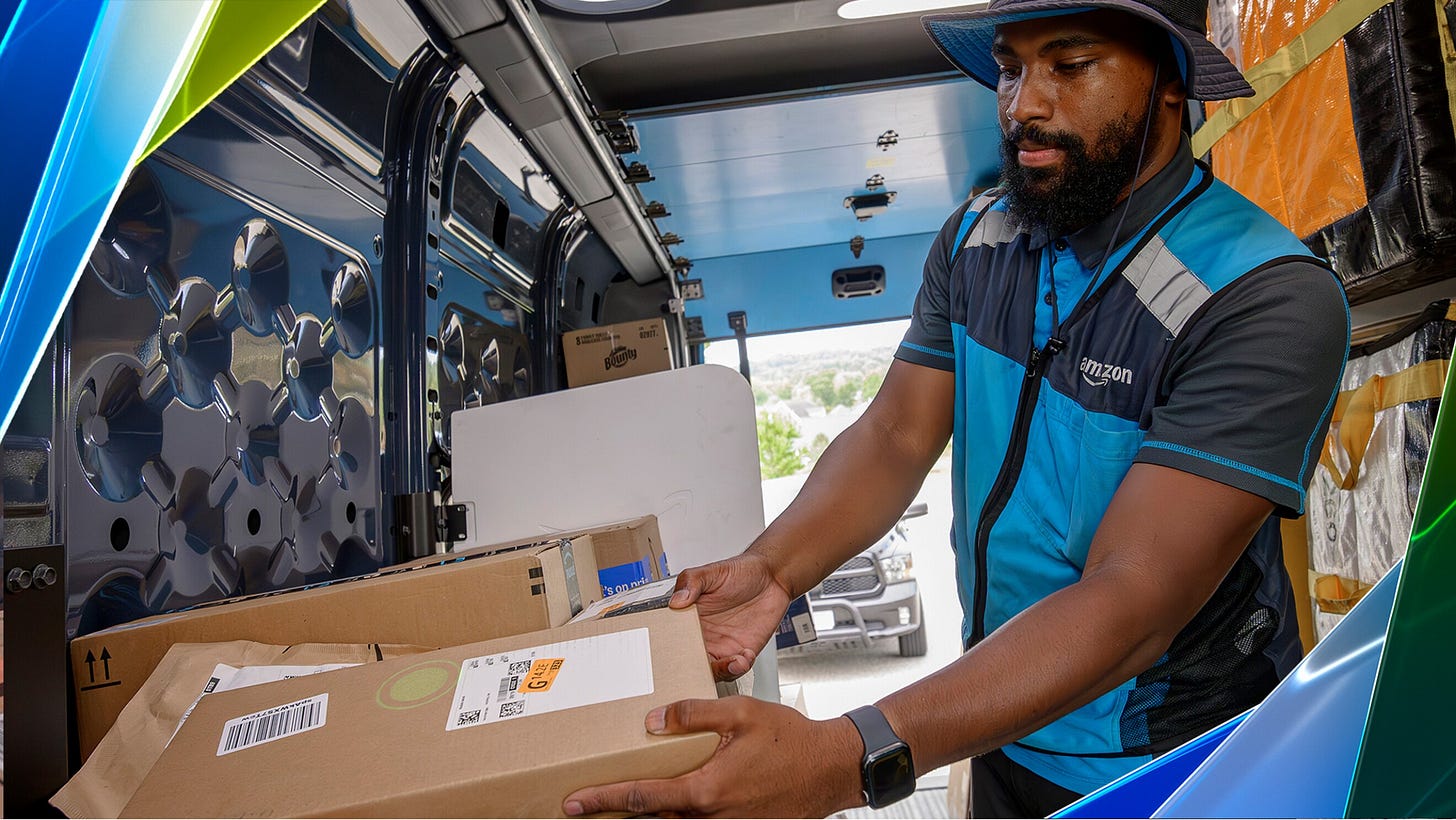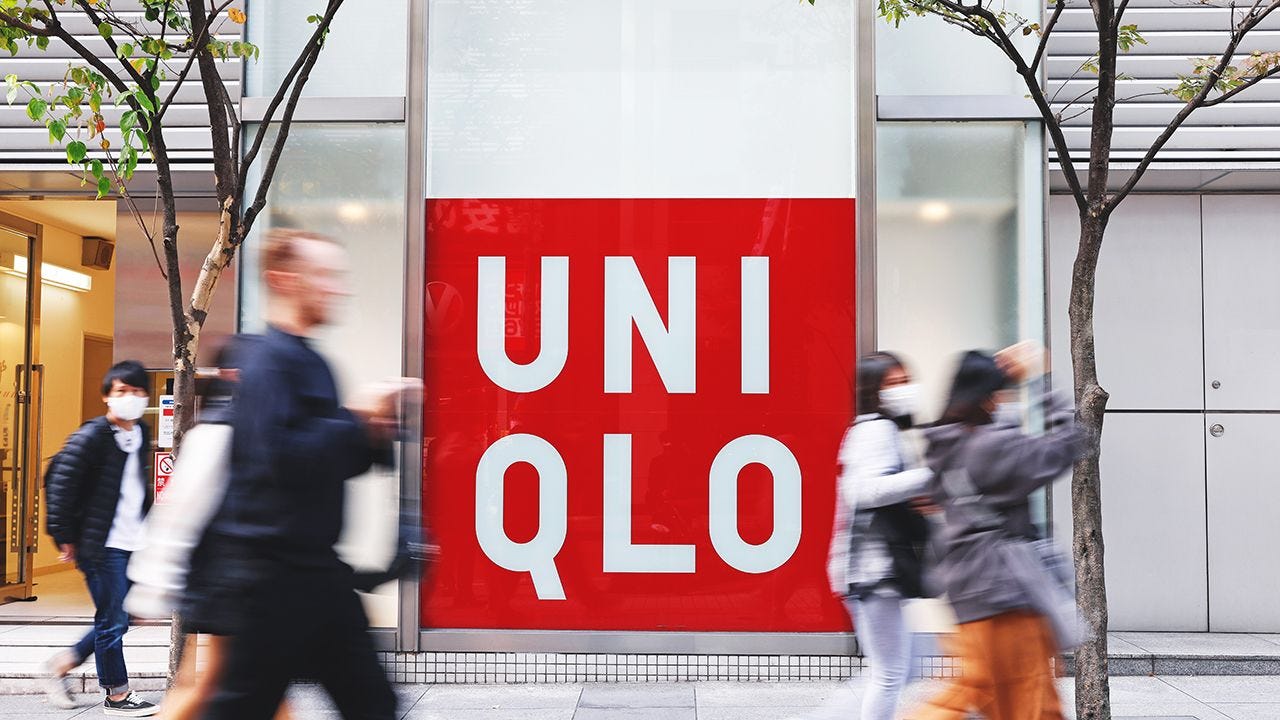This Week in Retail #47
Hey Friends,
October is halfway over and there officially 5 weeks left until Black Friday. It feels very hard to believe, but I’m often reminded by the Christmas decorations at my local home improvement store. This week was kind of a big week, with corporate shake-ups, new tech and updates coming from all over the place.
Amazon is reinventing last mile delivery again with new technology….Amazon Launches VAPR Machine Vision Technology in Delivery Vans: Amazon has unveiled VAPR (Vision-based Automated Package Reader), a machine vision system integrated into its delivery vehicles. The system uses advanced cameras and sensors to help drivers identify and organize packages in real time. VAPR streamlines the loading and unloading process, enabling more efficient and accurate deliveries. It reduces the time drivers spend locating packages and provides real-time feedback, significantly cutting down delivery errors and delays. This is part of Amazon's broader push to enhance last-mile logistics and delivery efficiency through technology.
In some technology news that isn’t as flattering…..Grabango Shuts Down Amid Funding Challenges and Declining Demand for Store Tech
Grabango, a checkout-free technology company founded in 2016 by Pandora co-founder Will Glaser, has ceased operations after failing to secure the necessary funding to continue. Known for its partnerships with major convenience store chains such as 7-Eleven, Circle K, Chevron, and GetGo, Grabango's technology allowed customers to skip checkout lines by automatically tracking purchases through its mobile app.
The company faced difficulties over the past year, including layoffs that reportedly impacted 40% of its staff, as retailers showed waning interest in costly automated solutions. Instead, many convenience stores opted to expand the use of self-checkout kiosks, which are more budget-friendly.
Grabango’s closure mirrors a broader trend in the retail industry, where even Amazon has scaled back its own Just Walk Out technology in stores, pivoting toward high-traffic venues like airports and stadiums. The impact of Grabango’s shutdown on its retail partners remains unclear. The company expressed gratitude to employees, investors, and clients, calling the decision to close “extremely difficult.”
Uniqlo (huge, huge fan) is continuing to dominate its expansion markets…..Uniqlo’s parent company, Fast Retailing, posted its third consecutive year of record profits, with a 31% rise in operating profit to 500.9 billion yen ($3.35 billion) for the fiscal year ending in August. The company surpassed expectations and reached 3 trillion yen ($20 billion) in revenue for the first time. Founder Tadashi Yanai emphasized plans for aggressive expansion in Western markets, aiming to become a top global brand and surpass 10 trillion yen in annual sales.
Uniqlo’s performance benefited from a weak yen, increased tourism-driven shopping in Japan, and strong demand for summer items. Profit margins exceeded 15% in all international markets. However, the company faces challenges in China, where it operates over 900 stores and has seen slower growth amidst economic uncertainty. Fast Retailing projects further profit growth to 530 billion yen in fiscal 2025.
In August, consumer resilience drove core retail sales to a new record, with spending rising even after adjusting for core inflation. This strength has sustained tenant demand, making retail the only major commercial real estate (CRE) sector with a lower vacancy rate than pre-pandemic levels, according to Marcus & Millichap’s Q4 retail report.
Retail vacancies have stayed below 5% for 11 consecutive quarters, with vacancy dropping to 4.3% across 42 major markets outside California. Tight inventory has driven rent growth and left most retailers focusing on existing spaces, as new construction accounts for only 0.4% of total stock.
Although potential headwinds like tightening budgets and a softer labor market remain, the recent interest rate cut is expected to ease borrowing costs, boost discretionary spending, and support retail foot traffic. In the investment space, smaller retail assets remain popular, driven by 1031 exchange transactions and growing demand for net-leased properties, especially fast food outlets.
Discount and off-price retailers are quickly backfilling vacated big-box spaces, and convenience store foot traffic has held steady or increased compared to 2023. As interest rates continue to drop, loan originations and investor activity are expected to rise.
Home Depot Requires Corporate Staff to Work Retail Shifts Quarterly. Starting in Q4 2024, Home Depot is introducing a policy that requires all corporate employees, including senior management and remote staff, to complete an 8-hour shift at a retail store once every quarter. The initiative, announced in an internal memo by CEO Ted Decker, aims to bridge the gap between corporate operations and the retail floor by offering firsthand insight into customer interactions and the challenges store employees face.
The goal is to foster empathy and better decision-making at the corporate level, ultimately creating a more unified company culture. Decker emphasized the importance of staying connected to the core business, saying, “We need to truly understand the challenges and opportunities our store associates face every day.”
While this initiative revives a pre-pandemic practice that had been put on hold for safety reasons, it comes at a time of rising labor activism and declining sales following the pandemic-driven consumer spending boom. The move is considered unconventional in the retail industry, but Home Depot hopes it will lead to better alignment between management and frontline workers.
Orvis to Lay Off 8% of Workforce and Close Stores: Orvis, a retailer specializing in outdoor gear and apparel, is cutting 8% of its workforce and closing several underperforming retail locations. The company cited changes in consumer behavior, particularly the shift towards online shopping, as a driving force behind the decision. Orvis plans to focus more on its e-commerce platform and other direct-to-consumer sales channels, as physical retail locations become less essential to its business model. The layoffs and closures are part of a larger restructuring plan to position the company for long-term sustainability.
McDonald’s has filed a lawsuit against Tyson Foods and other major meatpacking companies, accusing them of colluding to reduce beef production and artificially inflate prices. The lawsuit claims that Tyson, Cargill, National Beef Packing, and other firms manipulated the market starting in 2015, forcing McDonald’s to pay higher prices while boosting their own profits. These companies, part of the “Big Four” meatpackers, control roughly 80% of the U.S. beef market, giving them significant influence over pricing.
This lawsuit aligns with broader antitrust concerns, as the Department of Justice (DOJ) began investigating similar pricing practices in 2020, issuing subpoenas to the same companies. McDonald’s claims this collusion violated antitrust laws and further consolidated power within the industry.
The latest SipSource report reveals a bleak outlook for the U.S. wine and spirits industry, with wine sales from wholesalers to retail stores, bars, and restaurants dropping 8% and spirits sales falling 3.9% over the 12 months ending August 2024. This decline reverses years of growth in spirits and highlights a troubling trend for the industry.
High-end spirits were hit hardest, with bottles over $100 down 8.5% at retail and 12.5% in bars and restaurants. Expensive wines over $50 showed slight growth (under 1%), while Prosecco was one of the few categories to perform well, with sales up 2%. In contrast, affordable wines in the $8-$11 range—dominated by popular brands like 19 Crimes and Apothic—saw a sharp 12.7% drop.
Analyst Dale Stratton attributes part of the downturn to the lingering effects of pandemic-era spending patterns. Consumers who previously splurged on high-end Tequilas during lockdowns now seem to be buying less or shifting to lower price tiers. Additionally, the upcoming U.S. presidential election may be making consumers cautious about spending.
While sales are expected to stabilize during the holiday season, Stratton warns that growth remains unlikely in the near term. Direct-to-consumer wine shipments also continue to decline, with volume dropping 11% in the first half of 2024.
UPS Announces 5.9% Rate Hike Amid Rising Costs: UPS is raising its rates by an average of 5.9%, a move that will affect domestic, international, and air freight services. This price increase is being implemented to offset rising operational costs, particularly labor and fuel expenses. The hike comes on the heels of a new labor deal with the Teamsters union, which improved wages and benefits for workers, adding to UPS's cost structure. The rate adjustment is part of the company's strategy to maintain profitability while continuing to invest in its infrastructure and technology, as it handles increased e-commerce demand.
Seth Dallaire, formerly Chief Revenue Officer, has been appointed Chief Growth Officer for Walmart U.S., overseeing an expanded division that now includes product, marketing, and design teams. This shift aims to align operations more effectively to enhance customer experiences and drive growth across Walmart’s omnichannel initiatives.
Under Dallaire’s leadership, Walmart+ memberships rose by double digits last quarter, Walmart Connect grew 30%, and Walmart Data Ventures nearly tripled its client base year-over-year. The U.S. marketing team, led by CMO William White, and the design team, led by Valerie Casey, will now report directly to Dallaire to strengthen the connection between customer loyalty, insights, and financial outcomes.
Dallaire, who joined Walmart in 2021 after roles at Instacart, Amazon, and Microsoft, will also oversee the product division following the departure of Chief Product Officer Jon Alferness, who will stay on as an advisor through year-end. This restructuring reflects Walmart’s focus on accelerating its shift toward an omnichannel business model, emphasizing data-driven, personalized customer experiences.
7-Eleven is shuttering 444 underperforming convenience stores in North America as part of a strategic pivot, according to parent company Seven & i Holdings’ latest earnings report. The retailer is also set to raise $520 million by selling and leasing back an undisclosed number of properties, with that deal expected to close in February 2025.
The closures and sale-leasebacks come amid a difficult consumer environment in North America, where inflation, high interest rates, and declining incomes have led to reduced spending, especially among lower- and middle-income consumers. Seven & i lowered its fiscal 2024 net income forecast by 44%, now expecting 163 billion yen instead of 293 billion yen.
While 7-Eleven focuses on trimming non-core assets, it continues to expand in areas with higher demand and is refreshing stores with improved food, beverage offerings, and merchandising. Separately, Seven & i is spinning off its supermarkets and specialty stores into a new entity, York Holdings Co., Ltd., as it prepares to rename itself 7-Eleven Corp.
These strategic moves follow the company's rejection of a $39 billion acquisition offer from Alimentation Couche-Tard, owner of Circle K, and consideration of a revised bid reported to be as high as $47 billion.
That’s all folks……have a great week.






